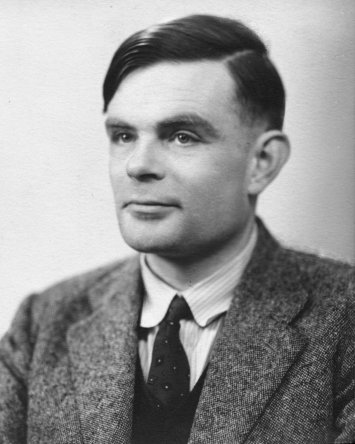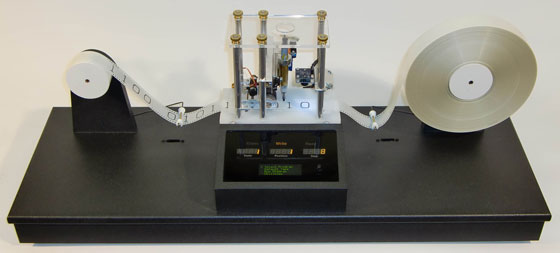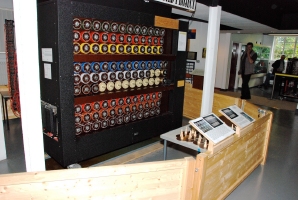Lexicon
Reality perception is an entirely different subject from its communication to others, which is done by some kind of system.
In our case we are concerned with its communication through a writing system.
From the writing system, we are specially concerned with its lexicon.
Subject is endless but the point to be made here is that a person or a group of persons, can invent a writing system such as this example<
Given the possibilities to check it up, it seems that is simply a hoax.
It is possible to distinguish the hand writing as similar to an apparently real system which existed, The Voynich manuscript
The Google translator with automatic recognition says it is Sotho language but it will not translate.
.jpg)
Another example:
This page we are on at this moment, if I press the option to see it as the computer language I am writing it, will look like that:
<html>
<head>
<title>Lexycon</title>
<meta http-equiv="Content-Type" content="text/html; charset=iso-8859-1">
</head>
<body bgcolor="#FFFFFF" text="#000000">
<p><font face="Arial, Helvetica, sans-serif" size="7"><b>Lexycon
</b></font></p>
<p><font face="Arial, Helvetica, sans-serif" color="#FFFFCC"><font
color="#000000">A
percepção da realidade é um assunto inteiramente
diferente,
que é a comunicação desta num sistema, no caso</font></font>
</p>
<p><font face="Arial, Helvetica, sans-serif"><b><a
href="Reality%20Perception.htm">Reality
perception</a></b> is an entirely different subject from its communication
to
others, which us done by some kind of system.</font></p>
<p><font face="Arial, Helvetica, sans-serif">In our case
we are concerned with
its communication through a <a href="http://en.wikipedia.org/wiki/Writing_system"><b>writting
system.</b></a></font></p>
<p><font face="Arial, Helvetica, sans-serif">Subject is
endless but the point
to be made here is that a person or a group of persons, can invent a writting
system <b><a href="http://www.lycaeum.org/mv/anagrams/Voynich/PARALINGUA.cgi?article=Uyesoy">such
as this example<</a></b></font></p>
<p><font face="Arial, Helvetica, sans-serif">Given the
possibilities to check
it up, it seems that is simply a hoax.</font></p>
<p><font face="Arial, Helvetica, sans-serif">It is possible
to distinguish the
hand writing as similar to an aparently real system which existed, <a href="http://en.wikipedia.org/wiki/Voynich_manuscript"><b>The
Voynich manuscript</b></a></font></p>
<p><font face="Arial, Helvetica, sans-serif">The Google
translator with automatic
recognition sayks it is <b><a href="http://en.wikipedia.org/wiki/Sotho_language">Sotho
language</a> </b>but it will not translate.</font></p>
<p><img src="800px-Voynich_Manuscript_(119).jpg" width="508"
height="608"></p>
<p> </p>
<p> </p>
<p> </p>
</body>
</html>
But actually, what the computer "sees", to us is a matrix of numbers, and although unbelievable as it may seem, made only by "0" zeroes and "1" one's!

This is the most complicated situation a human mind can face when it comes with things such as Finegans writing system and since it is meaningless to untrained eyes, let's take a look how our alphabet turns into zeroes and ones:
Computer languages were invented to avoid the pains and complication of writing programs in zeroes and ones.
Theoretically the person, or human being who perceived that was Alan Turing. He was so sharp that he broke the German code and this was a basic asset for the British in winning the war. An Interesting movie was recently made on him and it is indicated to the 2015 Oscar.
Physically, i.e., an actual working model of the possibilities Alan Touring perceived, in terms of the Modern Electronic Computer as we know was achieved by John von Neumann , possibly the most intelligent man ever, although Einstein has the fame.
John was intellectually precocious and had a photographic memory. As a young child he learned to speak German, French, and classical Greek, and amassed an encyclopaedic knowledge of historical events. A favorite party trick of his was to memorize a page of the telephone book. He would ask a visitor to the Neumann household to select a page of the book, which he would then read through a few times. He would then hand the book back to the visitor and ask them to quiz him on the page, say by giving him a name and asking for the phone number, or getting him to recite a sequence of names, addresses and numbers in order. He was rarely wrong.
His creation was the von Neumann Architeture. More details, as the above at John von Neumann: The Father of the Modern Computer
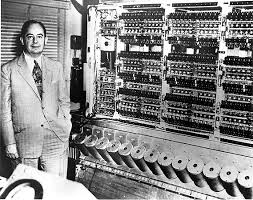
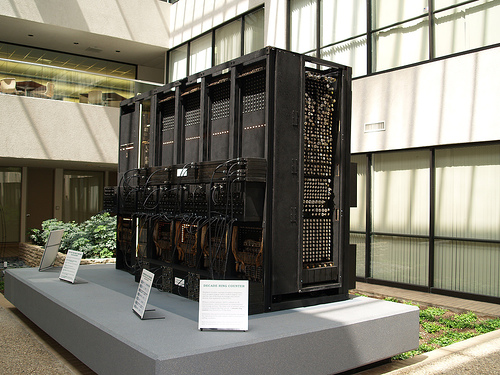 IBM 701
IBM 701 360
360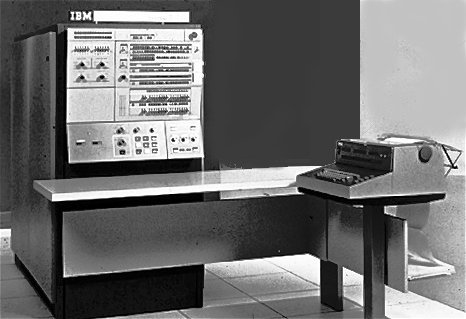
As matter of fact, everybody else did the same...
If you are an IBM old timer such as me, and you had the chance to see this machine above, you will recognize instantly the family of computers who made IBM what it is, or was, and how the Personal Computer was made possible.
The personal computer was invented to translate complicate machine code such as above to a third party company owned by Bill Gates. The solution he did was actually what we know as the PC. He told IBM, which arrogantly dismissed him and the rest is history.
This whole thing here was put through because I am tired of hearing, reading, specially in graduation and post graduation thesis, the splash that the Ivory Tower does about James Joyce knowledge and use of languages. Or how he does it.
The Ivory Tower simply ignores what this is all about and has fanciful ideas about its possibilities.
The same way that mankind learned to create high level computer languages which compiles the complication above, it is possible to create a compiler to bring to everyday level anything James Joyce, or whoever, did. And it will not take so much time as Joyce thought, when he said:
I've put in so many enigmas and puzzles that it will keep the professors busy for centuries arguing over what I meant, and that's the only way of insuring one's immortality.
If the person who wants to tackle it has some expertise and the help of computers, as it is our case here.
As matter of fact, it has already been done, but outside the possibilities the computer brought us.
This whole job here is simply put it together and easily accessible with the same logic as above.
Take a look at Finnegans
Jargon or A
Classical Lexicon for Finnegans Wake: A Glossary of the Greek and Latin
in the Major Works of Joyce, Including Finnegans Wake, the Poems, Dubliners,
specially Finnegans
list
